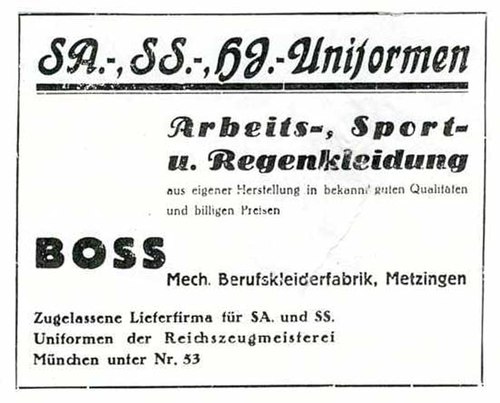
Throughout history, certain brands have been associated with dark and controversial periods. Among them, Hugo Boss, the renowned German fashion house, was involved in providing clothing for the Nazis during World War II. This troubling and often overlooked historical reality raises ethical and moral questions about the role of fashion in times of conflict and oppression.
In the 1930s, as the Nazi Party began to rise in Germany, Hugo Ferdinand Boss, the founder of the brand, saw a business opportunity. The Hugo Boss company was tasked with producing uniforms for members of the Schutzstaffel (SS) and other Nazi paramilitary organizations.
The uniforms created by Hugo Boss were recognizable for their austere aesthetic and sinister symbolism. They were meant to reinforce the image of power and superiority that the Nazis sought to project. SS uniforms were notably marked by the infamous skull and crossbones insignia, a symbol of terror and violence.
Hugo Boss' collaboration with the Nazi regime raises moral and ethical questions. Was the brand motivated by ideological convictions or simply economic considerations? Were the company's leaders aware of the atrocities committed by the Nazi regime?
It is important to note that Hugo Ferdinand Boss joined the Nazi Party as early as 1931, two years before Adolf Hitler came to power. However, it is difficult to determine the extent to which he was personally involved in the regime's crimes. After the war, Boss was interrogated and his involvement was acknowledged, but he was not prosecuted for complicity in war crimes.
It is worth noting that Hugo Boss' involvement with the Nazi regime was not unique in the fashion industry of the time. Other German brands were also associated with providing clothing for the Nazis. This raises broader questions about the responsibility of companies and individuals in times of crisis and conflict.
Today, Hugo Boss is an internationally renowned brand, known for its luxury clothing. The company has acknowledged its dark past and publicly apologized for its role in supplying uniforms for the Nazis. It has also taken steps to promote peace and equality, supporting social and humanitarian initiatives.
The history of Hugo Boss and its involvement with the Nazi regime serves as a reminder of the importance of vigilance and ethics in the world of fashion and business. It also reminds us that brands have a social responsibility and must be aware of the impact of their actions on society.
It is crucial not to forget this dark period in history and to continue drawing lessons from it. By learning from the past, we can strive for a better future, one where fashion and business are driven by principles of compassion, inclusivity, and respect for human rights.
Sources
Weird - 16 juin 2023 - Rael2012 -  - Voir l'historique
- Voir l'historique























